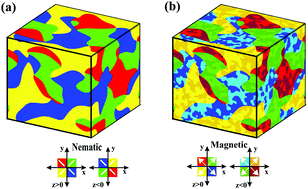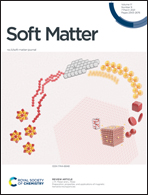Domain growth in ferronematics: slaved coarsening, emergent morphologies and growth laws
Abstract
Ferronematics (FNs) are suspensions of magnetic nanoparticles in nematic liquid crystals (NLCs). They have attracted much experimental attention, and are of great interest both scientifically and technologically. There are very few theoretical studies of FNs, even in equilibrium. In this paper, we study the non-equilibrium phenomenon of domain growth after a thermal quench (or coarsening) in this coupled system. Our modeling is based on coupled time-dependent Ginzburg–Landau (TDGL) equations for two order parameters: the LC tensor order parameter Q, and the magnetization M. We consider both shallow and deep quenches from a high-temperature disordered phase. The system coarsens by the collision and annihilation of topological defects. We focus on slaved coarsening, where a disordered Q (or M) field is driven to coarsen by an ordered M (or Q) field. We present detailed results for the morphologies and growth laws, which exhibit unusual features purely due to the magneto–nematic coupling. To the best of our knowledge, this is the first study of non-equilibrium phenomena in FNs.



 Please wait while we load your content...
Please wait while we load your content...